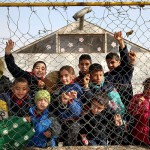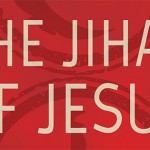 The below originally appeared on Aaminah Khan‘s terrific blog, Days Like Crazy Paving, where it was illustrated with the picture above and titled Muslim, queer, feminist: it’s as complicated as it sounds. I wanted to share it here (which I do with Aaminah’s permission) because I think it so perfectly illustrates the truth that we are all sailing in basically the same boat. Day by day I think we move toward one world. I love this particular step in that direction.
The below originally appeared on Aaminah Khan‘s terrific blog, Days Like Crazy Paving, where it was illustrated with the picture above and titled Muslim, queer, feminist: it’s as complicated as it sounds. I wanted to share it here (which I do with Aaminah’s permission) because I think it so perfectly illustrates the truth that we are all sailing in basically the same boat. Day by day I think we move toward one world. I love this particular step in that direction.
Take it away, Aaminah:
There are three aspects of my identity that really can’t be untangled from each other:
I am a queer woman.
I am a feminist.
And I believe that there is no god but Allah, and that Muhammad is Allah’s messenger.
Yeah, it’s the third one that usually gets the record-scratch reaction.
I was raised Muslim, but in my teens, I became severely disillusioned with the faith. Having finished reading the Qur’an in English for the first time, I started to fully appreciate just how easy it was for people to twist and re-interpret the book to serve their own needs. I realised my father had been doing that to me for years, with his rules that he swore came “from God” and his restrictions on my behaviour that were all part of me being a good Muslim girl. Cover yourself so men don’t stare at you; do not draw attention to yourself; avoid the company of men, for being around them will always be a temptation to the both of you. Obey your elders in all matters, even when you know they’re wrong. Abstain not only from sex, but from any kind of intimacy outside of marriage. Be chaste. Be a credit to your family. Be the version of good the people running your life expect you to be.
It all seemed so convenient, the way every time my dad wanted me to do something, he could find a religious reason for it, but when I pointed out things in the Qur’an that seemed to contradict him, he had a way of twisting the words so that he was in the right. It was frustrating, infuriating. It was around this time that I stopped trusting my father all together.
But that’s another story.
I think I was sixteen when I made the choice to give Islam another try – on my own terms, this time. By this time, I’d made gay friends; nurtured quiet, unrequited crushes on both boys and girls; sung in choirs and acted on stages without my father’s knowledge; cultivated friendships with boys and even flirted a little, though all in secret. I’d taken to studying my developing form – coltish and awkward, but with a hint of a promise of what it would eventually become – in the bathroom mirror late at night when everyone was asleep, wondering about how it might feel to have someone else see it, even desire it. And I thought about reading the Qur’an as a child and how it had made me feel like I was connecting with something bigger than myself, something that had space for a square peg like me. I wondered if I could find that connection again, if maybe there was more to Islam than authoritarian men telling me what to do. Maybe there was a message for me in there, and I could find it.
So I looked. I read the Qur’an in Arabic, then in English again – more critically, this time, my mind free of the expectation that I would find things that would confirm what I’d been told as a child. I read about Islamic history and the development and stagnation of Sharia law. And while I did all of that, I looked inward. I prayed. I meditated on who I was and what I wanted and where I was going and where my path might lead. I did as Allah instructed me: I questioned everything. I did as my Prophet instructed me: I sought knowledge. I sought it everywhere – in the Qur’an, in religious commentaries, in the Hadithes, in the sacred texts of other faiths, in discussions with friends who thought the concept of a creator was as ludicrous as the idea that the world was flat. I drank all of it in, filtered it through the lens of my own reality, searched for the things that I felt were meant just for me.
It was a long process. I haven’t finished yet. I don’t know if I’ll ever finish. I’ve spent many, many hours buried in books or deep in prayer or engaged in long conversations with my partner about the nature of good and evil and the meaning of life and what God’s purpose for us is, or if there’s a purpose at all. I think I’ve found some of the answers, and I think there are some I’ll never find, not that it’ll stop me from looking. But here is what I’ve found out so far:
It’s possible to be queer and Muslim. This was actually the easiest thing. Restrictions about pre-marital sex and sex with people of the same gender made plenty of sense in a society without contraception or antibiotics, where there were no paternity tests or laws guaranteeing child support (though Islam does have provisions for spousal support in the event of a divorce). I have access to condoms, dental dams, the oral contraceptive pill, penicillin, STD testing. I can terminate unwanted pregnancies safely if need be. Islam, Allah says, is a religion for all people in all times. I do not believe the Creator meant for us to live forever as though scientific progress never happened. And more importantly, I believe that my god is a god of love, and that expressions of love between people of any and all genders are one of the holiest acts that we as human beings can perform. The love between two men or two women or a couple of varying non-binary genders, or even that of a group of consenting adults of various genders, is a holy and sacred thing. The love a gay couple has for an adopted or surrogate child is a holy thing. The love a parent has for a gay or trans child is a holy thing. I do not believe that my God, the Most Beneficent, the Most Merciful, would ever begrudge human beings any acts of love. I believe, in fact, that it is through love that we express the part of ourselves that is closest to Allah in both substance and likeness. We were meant to love. We were meant to express that love and share it with others.
It’s possible to be feminist and Muslim. It’s possible to be sex-positive, to support the rights of sex workers, to support the rights of women to work or stay at home (both protected in the Qur’an), to support the rights of women to demand sexual satisfaction (also guaranteed in the Qur’an), whilst being Muslim. It’s possible to support both the right of a woman to wear a burqa or niqab or dupatta and the right of a woman to wear a miniskirt and high heels. I believe the concept of hijab is about more than modesty – I think it’s about comfort, boundaries and deciding for ourselves what we will and won’t let other people see. Not all Muslim women cover their hair – not even all Muslim women who are pious, devout, practicing mumineen cover their hair. I believe, for the same reasons I outlined above, that a woman can enjoy intimate relations with a partner outside of marriage, provided she does so safely. I believe women have the right to live their lives without fear of harassment from men, another right enshrined in the Qur’an. Islam is, Allah tells us, a permissive religion. It is meant to make our lives easier, happier and more peaceful. Feminism is also meant to make our lives easier, happier and more peaceful. Islam is also a religion of justice (the Most Just is one of Allah’s ninety-nine names), and feminism is a movement for justice. Islam, I believe, is – or can be – an inherently feminist faith.
It is possible to be me and be Muslim. I wear miniskirts. I flirt with cute girls in bars. I drive my mother to distraction with my scoop-neck t-shirts and exposed legs. I have male friends. I have loved women and men and people who are neither or both or a complex mixture. Islam is not my father telling me that I can’t join the choir because good Muslim girls don’t sing in public. Islam is not a man telling me I need to cover myself or feel ashamed. Allah does not ask me to be ashamed of myself. Allah asks me to love, to feel compassion, to be empathetic, to give my life in service to the creator and to creation. These are things I can happily and willingly do.
The word “Islam” means “peaceful submission to Allah”. The word “Muslim” means “one who has submitted”. I have opened my heart to the love of Allah and it has enabled me to be a more loving person. I have submitted peacefully to the idea that I must live in service of the creator and creation, and it gives me joy and peace to do so. I have a path and a purpose. I understand some of why I am here and what I must do. I do not know everything. In fact, I do not even know if what I do know is correct. But I know that whatever decisions I make, however I let Allah into my life, it will be on my terms – as a feminist, as a queer woman. As a Muslim, devoted to Allah, carrying the message of love and hope and compassion and peace of the Qur’an in her heart always and forever. As a servant of creation: a speck living on a speck orbiting a speck in a cluster of specks surrounded by other specks, a whole so large that only one outside it could see all of it.
I do not speak for Islam. I do not speak for Muslims. I speak for one Muslim: myself. There are as many interpretations of the Qur’an as there are readers of the text. This is mine: a queer, feminist interpretation for my queer, feminist life. It is my path to peace. It is freedom from the shackles of uncertainty. It is my greatest and purest love.
And it is mine. Not my father’s or my mother’s or anyone else’s. Mine alone. My Islam. My way of life.
* * * * * * * *
Related post here on UC: Islam demystified











